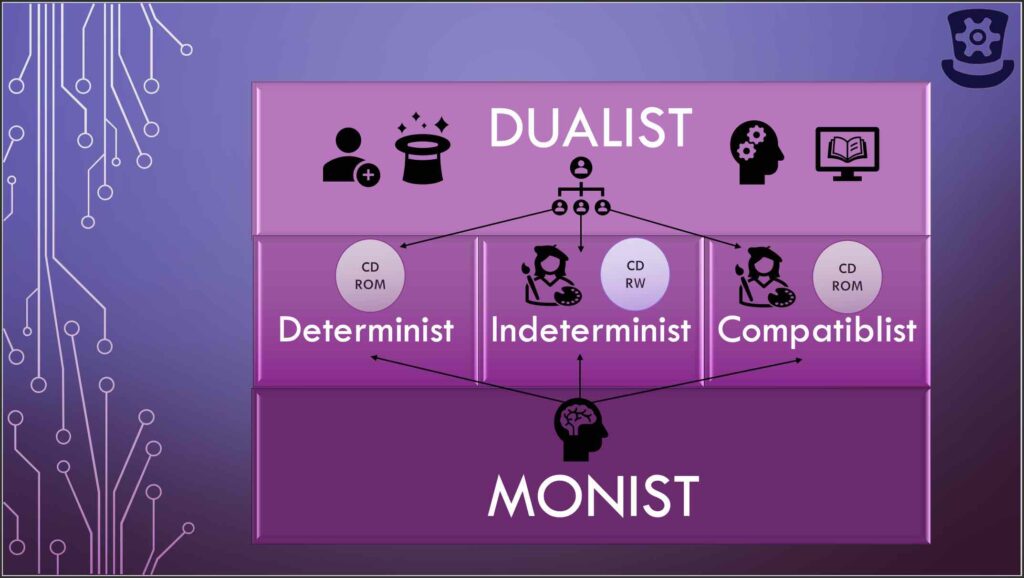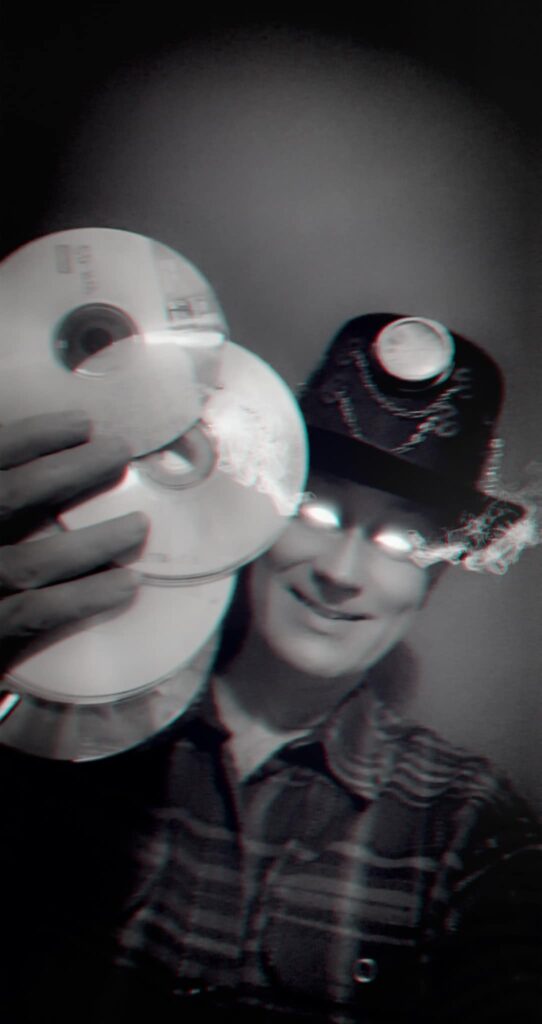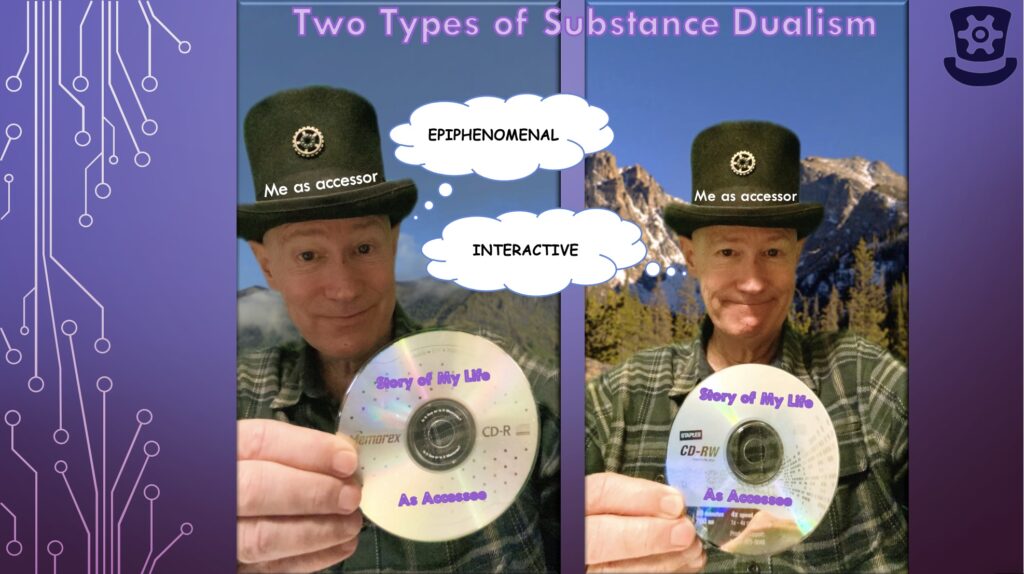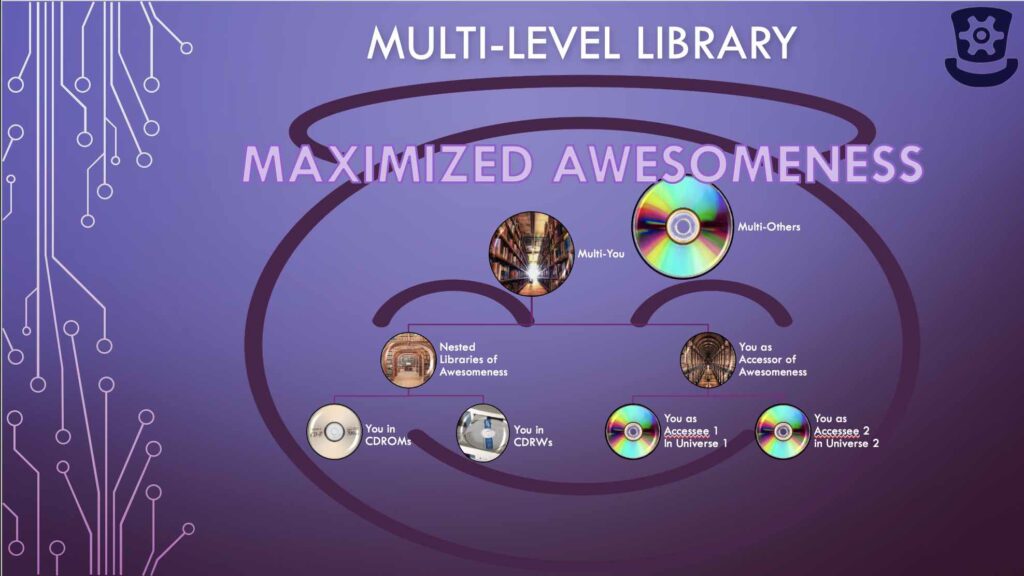Compatibilism – it’s a word some philosophers use to describe the way a Universe that’s set in motion, and hypothetically predictable, still meshes with the idea that we are responsible for making real choices in our lives. Pamalogy wants to ask how that question might matter for the maximization of awesomeness. Let’s talk about that. Ready?
If you came here expecting to engage in an old debate about determinism, soft determinism, compatibilism and non-determinism so that you could sharpen up your skills in taking the same old side you usually do, you clearly need to get a fresh orientation of Pamalogy. Pamalogy is a philosophical system, but it’s not philosophy as usual. Pamalogy wants to know about compatibilism from the standpoint of a different sort of question – how is awesomeness maximized?

Our listeners and readers are interested in awesomeness. Mainstream philosophy is optional. We don’t assume our audience necessarily knew much about philosophy before discovering and following us. We know you’re smarter than average, but our ongoing assumption is that you’re interested in making your world better. You want to know how to improve your life and the lives of those around you. Am I right?
But here we are on our twelfth episode, so I think it’s time we all dove in a little deeper. I really want to get into the meat of things with you today. I have something really cool to share about how all this works. So, I’m going to stretch our normal twenty seven minute blogcast into about 35 minutes. Is that OK? I think you’re ready for this.
So now, for the benefit of those readers and listeners whose first introduction to philosophy has been Pamalogy, I’ve been sprinkling in a few classical philosophical concepts at a time. Today we’ll talk about compatibilism and determinism. I’ll also explain the difference between substance dualism and epiphenominalism. You’ll hear these words all the time when talking to philosophers about consciousness, so I may as well bring them out right away today.
Now, if you really want a crash course in philosophy, I recommend the YouTube series by that very name, produced by PBS. It’s a great introduction. Hank Green II is an amazing narrator – up and beyond Bill Nye the Science Guy, in my opinion. Serious kudos fella, and you won’t want to miss his episode on Compatibilism. But in case you don’t have time, and you’re comfy right here, here’s a quick run down on all this terminology.
Determinism says the Universe is set in motion and can’t change its course. Soft determinism says that some behaviors are more determined than others. But it’s not a midway point to indeterminism, which disagrees with the idea of determinism altogether. Soft determinism is really just a synonym for compatibilism – our subject for today.
Compatibilism accepts hard determinism. The world is set in motion. The only difference is that compatibilism still finds a place for real moral decision making made by morally responsible people with an ability to reason. That’s why it’s sometimes called soft determinism. Because it sees the future as pre-determined by physics, it’s really just determinism. What it’s soft on is free-will. It thinks determinism is compatible with free will. Got that? Compatibilism equals determinism but with free-will. A lot of philosophers, and physicists don’t like free-will. They’re hard determinists. You’ll find that a lot. They also hate dualism. It’s so yesterday. But I’m going to bring it out of the dungeon and give it a fresh look today.
I covered substance dualism when we talked about René DeCartes in a previous blogcast. It’s the belief that the mind is a separate substance from the brain and body. For DesCartes the soul and the mind were one thing while the brain and the body were another. One dealt with the world of ideas and the other, with processing them. There was a connection point in the brain somewhere, but they were two very different things.
The problem with substance dualism is that if the mind isn’t a physical substance, like the brain and body are, then how can it have any causality in the world? How can the mind determine what the body does through the brain in terms of cause and effect? When someone admits that it can’t, but still holds that the mind is something different than the brain and body, there’s a special long word for that called, “epiphenomenalism.”
DesCartes was not an epiphenomenalist. Epiphenomenalism sees the mind as something that takes a ride along with the body. The mind doesn’t cause anything happening in the physical world. A substance dualist, like DesCartes, sees the mind as making decisions for the body. The mind is the body’s motivator but it isn’t part of the body. If the mind motivates and causes the body to do things, that’s not epiphenomenalism. That’s substance dualism.
I’ll come back to dualism and epiphenomenalism, but first I want to talk about compatibilism, determinism and indeterminism. Determinists think free-will is a myth. Compatibilists don’t. Both agree that the Universe is set in motion. Fate and destiny are predestined. A hard determinist describes a non-compatibilist. A soft determinist describes a compatibilist. That’s the end of today’s glossary. Vocabulary lesson over. Hit rewind if you need to.
So, who’s right?

Well, if you ask a determinist, they’ll point out the contradiction between free-will and fate. If you believe this Universe is all there is, then that argument is cut and dry. Isn’t it?
Really, I think, the big divide has more to do with values. The compatibilist wants to preserve the idea that we can choose whether to do the right or wrong thing. It wouldn’t even matter whether the very sense of something seeming right or wrong was nothing more than a state of the brain. There would still remain something called moral values. Are there?
A pamalogist will say yes. but we’ll look at all this very differently because we wouldn’t believe that this Universe is all that there is. We might agree that Universes can be deterministic in themselves, but for those who engage in consciousness in more than one Universe, there is a time traveling moral agent, choosing what it wants to experience. The pamalogist can be a determinist for any one Universe, but still finds compatibilism in the Multiverse.
I told you our perspective was different. And I have to warn you; it’s not a light subject. It can involve long sentences and paragraphs to explain. So, to make it a little easier to understand, I’m going to offer up an elaborate metaphor, which we’re going to refer to as “multi-level libraries.” We’re going to start small, with the contents of those libraries. They are digital libraries full of compact discs – CDs. Remember the days before iPods? We used to carry them in our back packs as we jogged with our headphones or listen to them as we drove. Does your car have a slot for a CD? Does your computer?
So, CDs – Compact Discs. Remember when I was talking about a point in common that Calvinist predestination had with Pamalogy in Episode 7? I was explaining that the present acts as if it’s part of the past from the perspective of that which has access to all points in time.
To help explain what I meant I compared a record with a CD. Do you remember records? Albums? What I called a temporal Universe acts like a record player. If you don’t lift up the needle and skip, songs play in order from the first to the last. With an album, you put the needle into the groove on the outside and let its shape and weight brush against its vinyl walls at the constant rate of speed of thirty three revolutions per minute as the album spins on the record player. If you have a single, set it to 45.
That’s how it is with an intra-temporal Universe. Time keeps on ticking from past, to present to future. The music at the end will eventually play, but not until the music at the beginning has first played. I used the word “intra-temporal” Universe as a contrast to an extra-temporal one.
Extra-temporal Universes worked more like CDs. You access specific data on the CD that you jump to. What you ask for will immediately direct a laser light to the spot on the CD that contains that data or experience and access it immediately. You could jump to the beginning or middle of any song you wanted, or place in a DVD that is indexed. Whether it’s “read only” or “read or write,” you don’t have to wait for the laser to pass through every possible spot of its polycarbonate surface to access the part of a song or movie that you want to jump to. You just jump straight to it at quantum speed. CDs can access any sort of data. It doesn’t have to be songs or movies, but we’ll stick to songs for now so we can compare CDs to albums. They can be played from beginning to end, but you don’t have to do it that way.
Now imagine that a song on a CD is a persons life in a temporal world.
Any part of the CD is accessible at any time from your perspective as the owner of it. What I want you to imagine is that this library you are in contains CDs that are capable of playing back everything in your life from beginning to end, without missing the slightest detail. You are there in the library, playing the CD of your life.
Now as the one who is playing the CD, you would have the ability to program it to randomly jump from song to song out of order. You could do that for as long as you wanted and you could choose any CD in the library. This is how extra-temporal Universes work in relation to temporal ones. There may be songs on that CD that are fun to hear from beginning to end, but the extra-temporal Universe can recall any part of any song at any time. The contents of that CD don’t change just because you access the contents.

Again, CDs can contain other types of data besides songs. I want you to imagine that the data on that CD is the information of your life. With a CD, you can travel backwards in time, or skip forward if you want. But there are two types of CDs – Read Only (CDROM), and Read Write (CDRW).
You don’t wind up with the dilemma as you travel through time that Marty McFly had if the CD is a ROM type CD. CDs like that are deterministic. But if you have the Read or Write type – the CDRW, then maybe you ‘ll be erasing the future as you go. That’s something that could have consequences for the library as a whole. For now, let’s assume that all the CDs in our library are read only type CD ROMs. If the CDs in the library that you were accessing were not just the possible stories of your life, but of the whole Universe, then those Universes would be fully deterministic. CDRWs – those you could change.
So here you are in a digital library full of CDROMs. The you in the library will experience the you-s in the CD ROMs that you choose if the life of a you can be found on those CDs. Do the laws of any of these CD ROMs control whether you access them? No. Even if they are CD ROMs, they don’t control whether or not you choose to access them. They don’t have that power. They only control what is within them, being what they are.
But there are two different you’s involved. It is you who are accessing them, and it is the story of you, experiencing them – both.
If these CD ROMs contain any manifestation of the story of your life within them as you, they only know that “you-ness” in terms of themselves. The CD doesn’t have any proof it is being accessed. From the perspective of the “you” digitally accessed as the CD itself, there is no “you” beyond itself. All the data is right there. Only the person you who chooses to access the CD knows the reality of the multiverse of digital lives in the library. The library is extra-temporal in relation to the CD. And unlike with a record album, any point in time on the CD can instantly be accessed.

In fact, any CD in the library can be accessed at any time. And this is an example of how time can be subject to consciousness. Consciousness may be subject to time from the CD’s perspective, but not from the perspective of the knower selecting and accessing the CD whenever it wants. The CDROM is intra-temporal, including the you’s whose story is burned into it, while the you who is accessing it never affects it. You only access it. You seem to be epiphenomenal in relation to it. And when you do access it, which is your choice to do, you enjoy the experience of being you both as the accessor and as an accessee. It’s an epiphenomenal relationship you have with the CDROM. The extra-temporal you dualistically accesses the intra-temporal you epiphenomenally in a CDROM type Universe and dualistically in a CDRW type Universe interactively.
So, let’s suppose that there is a series. Let’s say that Maximized Awesomeness is an unlimited Artist and loves optional endings. You know those interactive types of movies. You press option A, and the hero lives. You press option B, and they die. Or maybe you choose the way they escape. It’s like a video game. But in designing it, the author, Maximized Awesomeness, took that sort of interactivity to the extreme. Le’t suppose, that Maximized Awesomeness had created a different CD for every conceivable story that might include some novelly good thing in it that none of the others had contained.
It’s a very big digital library. And we’re going to keep coming back to this library metaphor as I explain how Pamalogy works, but before I do, I just want to clarify one thing that I’m not saying. I’m not saying we are living in a simulated reality like the Matrix. What I am doing is explaining what I mean when I use the word, “convergence.”
Convergence happens when one of the many stories of you is accessed by you as the extra-temporal you enjoys the library. The “you” in the CD is just one version of you. You converge with that version of you when you access any particular moment in that version of your life that’s on that CD as data. To help clarify what the difference between these two you-s are, let’s call the accessing you, “you the Accessor” and the accessed you, “you the Accessee.” They are both entirely real. No digital world is required.
You might use other words to describe all this. “You the Accessor” might be called “your soul” or “your spirit.” I’m going to reserve those words for something specific later on elsewhere, so please don’t do that. Is that okay? I’m going to want to make a very precise distinction between the soul and the spirit and the mind. For right now, I just want to show that whenever your life is accessed, there is a convergence between the accessor and the accessee in what you are. If the accessor does not have the ability to write onto the CDROM, but the accessor still has the ability to choose whether or not to access it, then with respect to the accessee, the accessor would have free will and none of the laws in the Universe of that CD control the accessee, even if they are fully deterministic. Capiche?
And this, my friends, is what a Pamalogist will be thinking about when they say they are compatibilists and object to the popular anti-compatibilist tendency in philosophy and physics today. All that it would require is that you as accessor live in an indeterminist extra-temporal Universe yourself as a person in that library.
Let’s consider that. You may have noticed that I placed Maximized Awesomeness as the author of everything in the library. That didn’t really need to be the case. So long as a CD can be written on, you the accessor can write on CDRW type CDs. You could even create whole libraries full of them, writing as many of your own versions of yourself as you wanted.
Let’s keep stretching this. What if you, in the library as an accessor, are also a story within a CD as a CDRW writer, and in that CD is a vast library of you’s accessing CDRWs or CDROMs, or both, which in turn contain so many versions of you? Libraries within libraries within libraries – stories of you writing your own life in multiple versions of you.
There’s nothing preventing you, in this picture, from engaging in a co-authoriship process with Maximized Awesomeness. You write what Maximized Awesomeness writes. You both write. Your writing is part of the writing of Maximized Awesomeness. Whether you have free-will in that writing or not, it is still a co-authorhip. You are collaborating with Maximized Awesomeness to create something. You are a co-creator, even as you are written. The physical laws of the libraries accessors have are not necessarily the same as the deterministic looking physical laws as the Universe cosmologists and physicists and neuropsychologists describe in what they call our Universe today.
So, you may ask: “is that true? … are there really accessors accessing lives of accessees like that from extra-temporal Universes?” And the answer is, as I so often say, “if it would be good it’s true.” Would there be something wrong with that? Would it be good? Then it’s true.
But to go back to our analogy. There you are in a vast digital library accessing moments of the various versions of your life. But you’re not God. You are just an accessor, and maybe a co-writer. A still more vast digital library also exists that contains the entirety of the library you are in as an accessor/writer. There may well be an uncountable number of levels of libraries nested within libraries this way. How many there are, you and I may never know. The one thing the pamalogist does know, is that it is as many as it takes to exhaust every good possibility.
The many-you theory arises from this sort of picture, along with the every-good-possible-version-of-you-theory, and this ultimate set of you-variety is the maximized version of the total you, especially when the each-version-of-you-theory includes every good possible moment and situation in every variety of ways that could include any novel form of good.
If that was true, that would be about the best news you could ever tell anyone. So feel free to do just that. Why not share the transcript of this blogcast with a friend. On top of that, earn yourself a top hat by completing our free Pamalogy 101 course. When they ask you where you got that cool hat, all you’ll have to do is send them a link. You won’t even have to explain it yourself. And best yet, Pamalogy 101 actually provides a priori proof that Maximized Awesomeness is true. It wasn’t in me to charge money for such good news. I hope you can understand why. Enjoy!
Make no mistake about it. When I speak of Maximized Awesomeness, I’m not cutting corners – at least not deliberately. More variety in your good stuff is better, and if Maximized Awesomeness is true, as Pamalogy 101 proves, then there are a lot of Universes contained in this library, where not only every possible version of you exists, but every possible version of everyone else and everything else that can possibly have consciousness. There is a lot of creativity in the imagination of Omniscience, so there are probably a whole lot of other lives and kinds of lives contained in this vast library, and those libraries of libraries, as well, ad infinitum. Anything that you happen to see at any time from any temporal framework, is simply borrowing moments from those libraries.
It isn’t a precise analogy. When we ask ourselves the question, “what could be better?” we are asking ourselves a question intrinsic to the Maximization of Awesomeness that helps us discern features of reality. We might ask for instance, whether it would be better if every variety of goodness was accessed. It’s one thing to have all the possible data. It’s another thing to access it all.
I think the answer to that question is yes and no. If there’s bad data you don’t want to be accessing garbage. But all the good stuff, definitely. And maybe there isn’t any bad stuff on there. Maybe you’ll just be looking for good stuff the whole time. It’s all accessed by Maximized Awesomeness. In fact, it is Maximized Awesomeness. I think I’ve mentioned a few times that the Being of God had to be the same as the Doing of God. God does what’s best. God is what’s best. But notice what I didn’t say. I didn’t say “accessed at all times.” The Extra-temporal nature of Maximized Awesomeness means being beyond but also including all time.
That’s why I keep bringing back these two words – extra-temporal and intra-temporal. A Universe may have a time frame or it may be timeless. Time could stand still in a perfect state of being and completion. All time would be contained within Itself. It would access all that was good in its inner libraries as writer of them all, co-writing in some cases, and co-reading, as well, in its Omniscient Omnipotent Omni-benevolence.
To return to our picture, Maximized Awesomeness accesses the Library as the Library and is the ultimate all encompassing Library of all libraries. It is both a state and action of converging access in one, of all that could possibly be good. As true as it may be that all good things always happen and Maximized Awesomeness knows them all at once in It’s very Being and Doing, time frames are a part, rather than the Whole. Extra-temporality may have many levels of extra-temporality contained within, like libraries within libraries within libraries, but there is an ultimate extra-temporality, as well, which is a constant. There is nothing good that can be added to it because it contains within Itself, and as Itself, all that could be good in either being or doing. It just doesn’t get any better than that.
That’s Maximized Awesomeness.
So to repeat, when I use the word “extra-temporal” I’m thinking of a library. Each library is extra-temporal in relation to the CDs full of stories it contains but it might be intra-temporal with respect to an extra-temporal library it is contained by. The only Library that has no extra-temporal library that It is contained by is Maximized Awesomeness. All possible time frameworks worth being part of reality are contained within it. That makes Maximized Awesomeness extra-temporal. And while you as an accessor may also be extra-temporal with respect to the CDROMs and CDRWs that you can access, that doesn’t mean you are Maximized Awesomeness. You as an accessor are a part of the outer Library of all libraries, but you as an accessor are not that Library of all libraries as a whole. You are just sharing part of It.
So, now that we have the multi-level library analogy firmly in our minds, and see where we fit in both as accessors and accessees, we need to look a little more closely at how convergence works and compatibilism works. Here’s where I bring up the subject of immateriality.
Think about it. You as accessor are immaterial with respect to any CD. This should be sort of obvious, but if science is telling us that there is no evidence of a soul, or of a mind that is really making any decisions, the assumption that all there is is the CD itself is being made. There is no library of CDs or access in that picture.
We’re being told there is no evidence for something that is not supposed to do anything more than access and share information. The word, “epiphenominalism” gets used. It’s a pejorative word. The mind doesn’t add anything to physics, even if it just tags along, so who needs it? The soul is looked down on by physicalists as a sort of ghost in the machine. It has no material substance. And it can’t be measured, so why even talk about it?
I said it before, and I’ll say it again. The reason the soul makes no sense to them is they see evil in the world. They don’t believe in the soul because they don’t believe in God. They don’t believe in God because of the problem of evil. But they aren’t disproving the existence of a soul by showing there is no brain state detecting a moral-agent prior to a decision with their EEG machines if souls are supposed to be epiphenomenally immaterial in relationship to the brain that’s found in the data of a Universe as a CD. At best, they’re showing there is no material soul involved in such a decision in the Universe itself. They aren’t finding evidence of it on the CD itself. This doesn’t mean the soul has no substance outside of the CD, in an extra-temporal Universe. They haven’t proven anything.
I think this analogy should help clarify an otherwise very confusing subject. Pamalogists aren’t saying the soul should be detected as a material there in their material Universe analagous to a CD, which they recognize as the data of the observable Universe. We are saying there is a convergence between the point in time indicated on the CD that involves you as an accessee, and the decision to access that point in time by you as accessor. That convergence involves two materially different forms of you – one whose nature it is to access, and the other whose nature it is to be subject to the laws of a Universe. On a CDROM type Universe, it is an epiphemenoal relationship with two minds involved – one that corresponds to what the brain can produce through the data of the CD, and the other that corresponds to the one who is enjoying the data on the CD from the library. If it is a CD ROM, the accessor can have no causal relationship other than to choose which parts to access.
Now if you were working with a CDRW and you as accessor were able to write onto the CD, then you might as accessor have some causal influence on you as accessee. You would then have the power to change the future of the whole world in terms of what was written on that CD. And if that were the case, then there could be some means by which such a cause was affected between your substance as mind and what decisions wold be made by any you on that CD. We might, for example, find in the way that light acts as a wave, something in probability curves that would affect behavior and decisions. In this case, even if everything in the Universe were exactly the same as in some parallel Universe, your physical brain state, would not force you to make the same decision. You would be free to make a choice – perhaps even a moral choice. But that’s just one way a CDRW data file could be manipulated.
Pamalogy isn’t saying whether we are in a CDROM Universe or a CDRW Universe or exactly what analogy best works for any given Universe. Pamalogy assumes we do both. We skip from one Universe type to another at any given moment, experiencing all types, we don’t always have knowledge of the other Universal types because there is a great deal of unknowing in the Multiverse.
Cosmologists will point to probability curves for light, but not necessarily for decision making, but in either case, epiphenomenalism is no dirty word to pamalogists. The generally immaterial nature of access doesn’t prevent anyone as accessor from operating in immaterial ways in relationship to the CDs found within the extra-temproal library, one way or the other.
People obsess over time. They’re convinced that anything that is in the past is impossible to change. The Pamalogist finds room for changing both the future and the past, depending on a Universe’s laws. It may not leave accessees free-will over the past in every Universe, but accessors can certainly skip to any point in the past and choose which moments to enjoy without respect to chronology if that data exists in their library. And if the laws of a Universe are of the CDRW type, they can change it.
Now what if every good pelssible moment of you, of every possible good version of you, was accessed and enjoyed at all times? Time helps us concentrate and focus. We’re in the moment. But that’s just a the way things are in a temporal Universe. An extra-temporal Universe may involve accessing whole libraries without losing focus. It’s a different sort of you. It’s a you that isn’t necessarily limited by the speed of thought or movement, as it is with the laws of this Universe.
So there’s another irony I want to point out here. While Maximized Awesomeness is complete and unchanging, on account of being so complete that nothing good can be added to It, you, as part of Maximized Awesomeness are not complete and unchanging. You may have extra-temporality as an accessor of multiple versions of you, but it is not inappropriate to describe you as possessing eternal life. This is because even extra-temporality is intra-temporal.
Well, all of this said, we really need to ask ourselves how all of these libraries came to be in the first place. What makes them happen? … why it is that I’m so confident that we can call Maximized Awesomeness a multi-level library this way. So, let’s talk about that next time. We’re going to begin with the concept of nothingness and ask ourselves what’s there. It’s going to take a few episodes and has to do with the difference between nothingness and somethingness and what exists in nothingness. That’s what we’ll talk about next time. Ciao!
URL for sharing this transcript page: https://pamalogy.com/2022/02/12/compatibilism/
URL for sharing this podcast: https://player.captivate.fm/episode/b840ef49-6daf-4b8d-ba00-c6498cdc3614
URL for sharing just the audio file: https://podcasts.captivate.fm/media/0b1447f6-110e-4ea7-beb5-eb8c5caa5e72/episode12-compatibilism.mp3
Previous: Determinism
Up Next: The Speed of Nothingness


